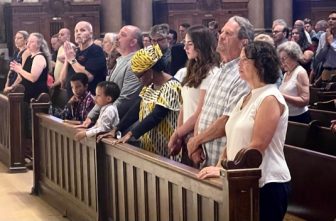In this column, we are going to look at the way the Church is the hope for a hopeless society. Jesus founded this Church, but he most often called this new community “the kingdom of God.”
Jesus was certainly not the first to use this phrase. He was picking up on perhaps the central Old Testament promise. How so?
God’s solution to the problem of evil and sin in the world was always very practical: it involved the calling into existence of a particular people — a community. The first 11 chapters of the Book of Genesis tell the story of the goodness of God’s creation and its swift plunge into rebellion, violence, fragmentation and idolatry.
Genesis 12 marks the beginning of the formation of a people — Abraham and his descendants — who would be the focal point where all that evil and sin was meant to find its reversal. This was to be the people of fidelity, peace, unity and worship of the true God.
And notice that it’s a community — a “we” — that is to be the solution. Through Abraham’s offspring would come the blessing that would reverse Adam and Eve’s curse (see Gen 12:3 and 3:17).
It’s worth underlining that this was to be a very practical, tangible and visible reversal. Instead of idolatry, the worship of many pagan gods, Israel would worship Yahweh, the creator, exclusively. Instead of perpetual oppression and slavery, Israel would be a people of freedom and flourishing — among themselves and for others. Instead of plundering and exploiting other nations to aggrandize themselves, like the other nations they lived among, this would be a congregation of distributive justice, sharing and special concern for the poor. Instead of a culture of violence, Israel would be a people of shalom, peace. And all these things would mean that, out of the tribes and peoples scattered at the Tower of Babel, Israel would be a nation of social solidarity and true community.
Israel was called to be the focal point of a renewed humanity after the fall. God gave them the land of Israel, the Torah (law) to live by — thus making their whole life different and unique — and of course, God made his own place to dwell in the temple in Jerusalem.
However, what is the other major theme of the Old Testament? Clearly, it is that Israel does not live up to her vocation. She worships other gods; she oppresses others and her own people; she seeks political aggrandizement. There is strife without and civil war within. The Torah is not kept, the temple is polluted with idols, the poor and the alien are oppressed and exploited, and the land is defiled with blood. Israel, in other words, has become just like the other nations she was supposed to be a light to. The solution has become part of the problem.
Therefore, Yahweh allows Nebuchadnezzar and his Babylonian army to come in, sack Jerusalem, burn the temple and take Israel away to exile in Babylon. In going to Babylon, the land, the temple and, in significant ways, even the Torah were taken away. God’s promises, it seemed, had failed. The great hope that God would establish a community that would be a light to the nations was dashed. Israel was now no different from the rest of the world, herself in need of redemption: Israel was scattered, Israel was sinful, Israel worshipped idols, Israel was oppressed and captive.
Everything was upside down and it seemed hopeless. Unless, that is, God himself acted to set things right. Israel needed release from captivity, to be back in their land, to reclaim the temple and to keep the Torah. They needed the defeat of their enemies. These were God’s promises, and Israel needed him to keep them. They needed salvation in these very concrete, visible, historical and social ways.
Much of the Old Testament, and especially the prophets like Isaiah, Jeremiah and Ezekiel, are written in the hope of this restoration. The Old Testament is a book of hope and expectation.
Next month, we’ll see how the prophet Daniel helped summarize these hopes and expectations in the shorthand “the coming kingdom,” which will help us understand why Jesus’ use of that phrase is so full of social relevance.
Miller is the director of the Center for Catholic Social Thought at Assumption in St. Paul. He is the author of “We Are Only Saved Together: Living the Revolutionary Vision of Dorothy Day and the Catholic Worker Movement,” published by Ave Maria Press.




